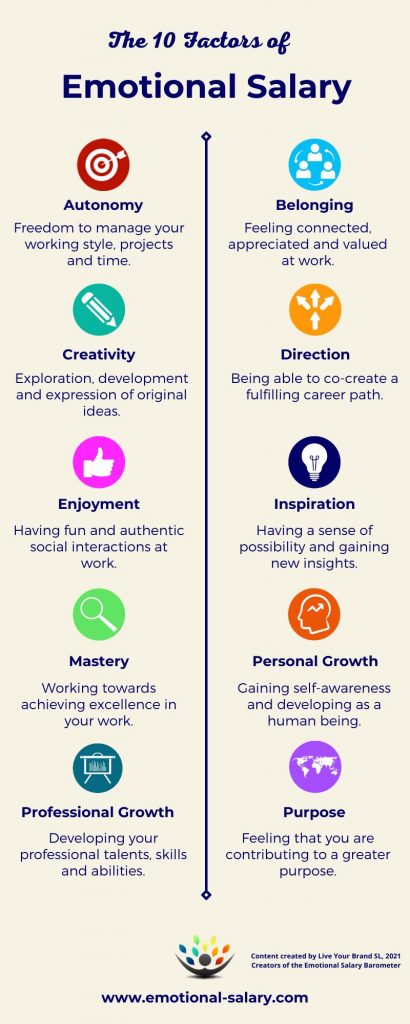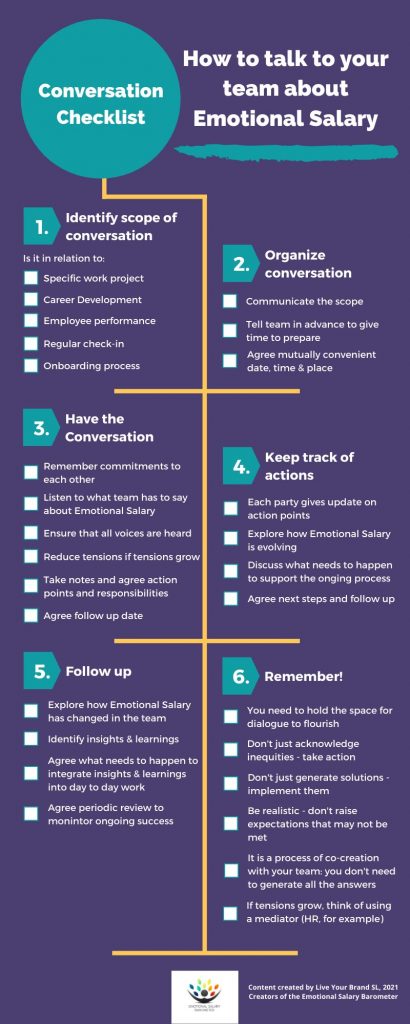Do you have a clear idea about what each one of your team members values most about their work? If you do, then congratulations – you’re in the minority! In this blog post we’ll explore why it is so important to understand your team’s Emotional Salary, learn how you can capitalize on it and how you can talk to your team about it.
What is Emotional Salary?
Emotional Salary is the emotional or non-financial benefits that we gain from our work. Non-financial benefits as such are not emotions, but they have a huge impact on our emotions towards work, the way we perceive work and the way we relate at work. This is why it is called “Emotional Salary.”
Another aspect that is important to be aware of, is that it is subjective. Here we do not have a one-size fits all – what each of your team members values most will probably be different, so it’s not something that you can make assumptions about. This is also another reason why it is so important for managers to understand it, because it needs another type of leadership skills, skills that will be more needed in the future work environment.
Our Emotional Salary is a fundamental part of what keeps us motivated and engaged at work. There is a very strong link between our Emotional Salary and our wellbeing at work. When our Emotional Salary is high, we put in more discretionary effort, which leads to better team and organisational performance.
Why understanding your team’s Emotional Salary is important …
If you understand exactly what each of your team members values most about their work and invest the time to have a conversation with them about their Emotional Salary, you will be able to create a working environment where each team member is maximising the emotional aspects they get from their work. They will learn how to get more of those aspects in a collaborative and co responsible way . This will enable them to take greater responsibility for their emotional wellbeing, grow personally and professionally, thrive and do their best work.
Although each team member will have different priorities, your existing company or team culture means that there are likely to be patterns within your team. Because of the unique combination of the team’s Emotional Salary, there will be unique actions that you can take that will benefit all of your team in the short and long term. By starting a conversation in your team about Emotional Salary you are empowering your team to take responsibility for what is important to them. You are enabling them to propose ideas on how to increase their Emotional Salary, which is likely to lead to a shift in your relationship with your employees into a more collaborative one. They will view their work and you as their leader under a new lens. You will both benefit greatly from this.
Now more than ever
In times of crisis and uncertainty, organisations need their people to pull together, be flexible, adaptable and go the extra mile. However, these are often times when individuals have significant new challenges to cope with, often both personal and professional. That might be keeping focus, adapting to a new way of working, having to juggle personal or family responsibilities/concerns, and worrying about the future. At the same time, teams and organisations are having to adapt rapidly to cope with the new situation, sometimes in extremely difficult circumstances where effective communication can be challenging and their financial future uncertain. As a manager or leader, you need to be up to the task and be able to lead your team through the situation and maintain their commitment and motivation despite the challenges and uncertainty. You both need to embrace uncertainty and use it for your own benefit.
When to talk to your team about Emotional Salary
Talking to your team about their Emotional Salary is not just something that should be done once a year at a performance or development review. It needs to be integrated into the team’s everyday conversations and a regular topic of conversation at team meetings. It should also be something that happens throughout the employee lifecycle. In order to maximize results, it is essential to explore Emotional Salary in a range of different situations and contexts – when you’re talking to a team member about a specific work project, addressing a specific challenge or when you’re having a career development review.
How to talk to your team about Emotional Salary
Here is a step by step guide of how you can talk to your team about Emotional Salary:
 1. Identify the scope of the conversation
1. Identify the scope of the conversation
It is important that conversations about Emotional Salary happen consistently, and continually, in a range of different contexts. This will help you to highlight how important it is, integrate it into the team and capitalize on it. However, it will be beneficial for you to be clear about the scope and context of the conversation. This will mean that you can have a focused conversation where you can get some clear information that is likely to be much more actionable. Some examples are:
-
-
- During the onboarding process
- In relation to a specific task or work project
- In a career development meeting
- When raising a performance issue
- Addressing a specific challenge you may be facing
- During a team meeting or regular catch up or check-in
-
2. Make sure that the 10 factors that constitute the Emotional Salary are well understood
Our study has demonstrated that Emotional Salary is constituted of 10 factors. Each of them represents an emotional benefit that your employees perceive in relation to their work. These benefits can motivate us, change our perception of work and lead to personal and professional development. It is important to explore how each factor is applicable in your specific work situation.
3. Organise the conversation
You don’t want your team members to feel blindsided. It is really important that you give your team members time to think and prepare for the conversation. You should agree a mutually convenient time and place and be clear about the context. Take your time to create a specific question you want them to think about and share it with them in advance. By doing this, you are more likely to get good quality information and be more efficient.
4. Have the conversation
Remember that you are likely to be talking about things that are fundamentally important to your team members. You must listen to what they have to say without interrupting, being dismissive or judgmental. Their perspective may be different to yours and there may also be different perspectives in the team if it is a group discussion. You may need to step in and reduce tensions. Your role is to ensure that all voices are heard and that team members commitments to one another are respected. Having the conversation is only the beginning of the process. You must identify action points to be taken and who will be responsible for them. Wherever possible, make sure it’s not always you, but someone from the team. By sharing the accountability you will increase engagement. Without determining what actions can be taken to improve the situation at the time of the conversation, there is a danger that nothing at all will happen. This is also the perfect time to agree the date when action points will be followed up. Make sure that this follow up does not end in radio silence.
5. Keep track of actions
It is essential that you keep track of actions and follow up. If you don’t do this the signal that it sends is that you do not care about what your team members have to say and you risk damaging your relationship with them. When you follow up you should ensure that everyone has an opportunity to give an update on the action points. Your focus should be on exploring how the team’s Emotional Salary is evolving and what needs to happen to support the ongoing process. Learn how to learn from the process! This is the fun part of Emotional Salary, it is a process whereby you are always learning from each other and growing together.
6. Follow up
There needs to be a periodic review process to monitor things on an ongoing basis. It doesn’t need to be a formal process, but your objective is to identify how Emotional Salary has changed for team members. There is a huge learning opportunity and you need to be able to identify the insights and learnings and agree what needs to happen to ensure that these are integrated into the team’s everyday work. Do systems or processes need to change? If so, how? Learn to register the gains of the process. This will motivate you and your team.
We have developed this conversation checklist to help you have focused and successful conversations about Emotional Salary with your team.

The six golden rules
Here are the six golden rules you need to bear in mind to ensure that your conversations with your team members about their Emotional Salary are successful:
1. You are the leader and you need to be able to hold the space so that your team members feel safe and dialogue can flourish.
2. If there appear to be any inequities, don’t just acknowledge them, take fast and decisive action on them.
3. Make sure that you don’t just come up with solutions but that you take action and implement them.
4. Be realistic with your team members and don’t raise their expectations if they’re not likely to be met.
5. Learn that you shouldn’t have all the answers and that is fine! It is a process of co-creation with your team members and they have a responsibility too.
6. If you are in a situation where tensions escalate, think about using a third party to step in and mediate (HR for example).
If you invest the time and energy in exploring Emotional Salary with your team, you will be rewarded with a committed and motivated team who continually and consistently grow and not only perform better, but have greater wellbeing.
If you’d like to delve deeper into how you can support your team’s Emotional Salary, then why not join our next Leaders Certification Programme. For more details contact us.
One thought on “How to Talk to your Team about Emotional Salary”
Comments are closed.